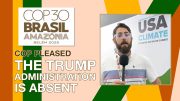A San Francisco superior court judge has put California’s sweeping plan to curb greenhouse gas pollution on hold, saying the state did not adequately evaluate alternatives to its cap-and-trade program.
In December, California regulators voted to cap the greenhouse gas emissions of the state’s major industries and establish the nation’s first broad-based carbon trading program. The panel voted 9-to-1 to approve some 3,000 pages of regulations and supporting documents, crafted over three years of intense negotiations with businesses and public interest groups.
California’s 2006 Global Warming Solutions Act requires the state to slash greenhouse gas emissions to 1990 levels by 2020 — amounting to a 15 percent cut below today’s levels. The complex cap-and-trade system is a centerpiece of the state’s multifaceted plan.
Already approved are rules to hike the fuel efficiency of automobiles, cut the energy intensity of gasoline and source a third of the state’s electricity from renewable sources. Under the plan, the state would cap each industrial plant’s emissions in 2012, gradually lowering the cap over the next eight years. Firms would be granted allowances for each ton of carbon dioxide they could emit.
Among the affected rulemakings under the scoping plan are the state’s low-carbon fuel standard, the cap-and-trade market and a 33 percent renewable portfolio standard for electricity by 2020. Taken together, these policies and others are meant to reduce greenhouse gases in California to 1990 levels by 2020, starting January 1, 2012.
In a 35-page decision, Judge Ernest H. Goldsmith said the Air Resources Board had failed to consider public comments on the proposed measures before adopting the plan, which affects a broad swath of the state’s economy. In particular, the judge noted, officials gave short shrift to analyzing a carbon fee, or carbon tax, devoting a “scant two paragraphs to this important alternative” to a market-based trading system in their December 2008 plan.
Goldsmith’s primary objection is that the Air Resources Board moved ahead towards approving a cap-and-trade plan without looking hard enough at viable alternatives.
The state agency “seeks to create a fait accompli by premature establishment of a cap-and-trade program before alternatives can be exposed to public comment and properly evaluated,” Goldsmith said in last Friday’s ruling, which the state and environmental group that sued over the plan received Monday.
“The brief, fifteen-line reference to the carbon fee alternative consists almost entirely of bare conclusions justifying the cap-and-trade decision,” the judge wrote. “Informative analysis is absent.”
The air board said it would appeal the judge’s decision, which was filed late Friday and released Monday. The one member of the board to oppose the cap-and-trade provision, physician John Telles, previously raised many of the same concerns brought forth in the decision.
Telles said the measure would not protect low-income residents from energy price hikes. He also suggested that a carbon trading market would be open to “manipulation,” as was the case with California’s disastrous deregulation of electricity markets in the 1990s.
The lawsuit was filed by six environmental groups opposed to cap-and-trade that represent low-income communities, including the Association of Irritated Residents, based in the San Joaquin Valley, and Communities for A Better Environment, which fights pollution around the ports of Los Angeles and Long Beach.
The groups contend that a cap-and-trade program would allow refineries, power plants and other big facilities in poor neighborhoods to avoid cutting emissions of both greenhouse gases and traditional air pollutants.
“This decision is good for low-income communities like Wilmington, Carson and Richmond,” said Bill Gallegos, executive director of Communities for a Better Environment. “It means that oil refineries, which emit enormous amounts of greenhouse gases and contribute to big health problems, cannot simply keep polluting by purchasing pollution credits, or doing out of state projects.”
California’s cap-and-trade program was strongly backed by Gov. Arnold Schwarzenegger over the objections of groups that prefer direct regulations, or a carbon tax, on industrial polluters. Under the market-based system, companies can meet their obligations by purchasing credits from other companies, or from projects such as forest preservation that cut pollution more cheaply.
“Claims of environmental harm from a program of tradable allowances for greenhouse gases are unfounded,” the Air Resources Board said in a statement on the judge’s decision.
“This decision is good for low-income communities like Wilmington, Carson and Richmond,” said Bill Gallegos, executive director of Communities for a Better Environment. “It means that oil refineries, which emit enormous amounts of greenhouse gases and contribute to big health problems, cannot simply keep polluting by purchasing pollution credits, or doing out of state projects.”
California’s cap-and-trade program was strongly backed by Gov. Arnold Schwarzenegger over the objections of groups that prefer direct regulations, or a carbon tax, on industrial polluters. Under the market-based system, companies can meet their obligations by purchasing credits from other companies, or from projects such as forest preservation that cut pollution more cheaply.
“Claims of environmental harm from a program of tradable allowances for greenhouse gases are unfounded,” the Air Resources Board said in a statement on the judge’s decision.
Environmentalists Against Cap-and-Trade
Conservatives have defeated national cap-and-trade proposals in Congress, but the California legal challenge comes from a different direction — grassroots “environmental justice” groups that consider the plan too weak.
They argue that companies that buy the right to exceed emission limits will also spew greater amounts of other pollutants on surrounding communities, mostly poor and nonwhite. The critics believe that businesses can also game the system by claiming environmental credits abroad, where enforcement is uncertain.
Politically influential green groups, such as the Environmental Defense Fund, the Nature Conservancy and the Natural Resources Defense Council have backed a cap-and-trade approach, and did not join the lawsuit by environmental justice groups.
Cap-and-trade is considered a “market-based” environmental program that the most leftist environmental groups oppose, because their concern is “environmental justice,” which links environmentalism with race and socioeconomic class-based causes.
Alegría De La Cruz, legal director of the Center on Race, Poverty and the Environment, said the plaintiffs have no intention of sidetracking clean-car standards and other beneficial state actions.
The group will make that clear in the scope of the order that Goldsmith asked it to draft to carry out his ruling, De La Cruz said.
The goal of the lawsuit is to get the state to adopt an “environmentally superior alternative” to cap and trade, she said.
Ironically, Republicans at one time were the leading proponents of cap-and-trade legislation, which was viewed as the more moderate, market-oriented approach to environmentalism. Ronald Reagan, Strom Thurmond, Trent Lott, and George W. Bush all supported cap-and-trade programs, such as those inherent in the Clean Air Act, as did former California Governor Arnold Schwarzenegger, while more liberal environmentalists oppose cap-and-trade on the grounds that they feel it discriminates against the poor and minorities.
Goldsmith also wrote in his decision that cap-and-trade fails to meet the requirements of the California Environmental Quality Act; his objection to the cap-and-trade provisions is not based in his opposition to environmentalism, but in his support of environmentalism.
Photo: Former Gov. Arnold Schwarzenegger addresses the California Air Resources Board urging them to adopt some of the nation’s most sweeping clean air regulations, in Sacramento, Calif., Dec. 16, 2010.




